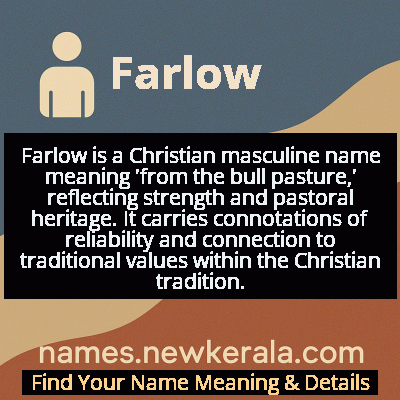Farlow Name Meaning & Details
Origin, Popularity, Numerology Analysis & Name Meaning of Farlow
Discover the origin, meaning, and cultural significance of the name FARLOW. Delve into its historical roots and explore the lasting impact it has had on communities and traditions.
Name
Farlow
Gender
Male
Origin
Christian
Lucky Number
3
Meaning of the Name - Farlow
Farlow is a Christian masculine name meaning 'from the bull pasture,' reflecting strength and pastoral heritage. It carries connotations of reliability and connection to traditional values within the Christian tradition.
Farlow - Complete Numerology Analysis
Your Numerology Number
Based on Pythagorean Numerology System
Ruling Planet
Jupiter
Positive Nature
Optimistic, inspirational, and creative.
Negative Traits
Scattered, exaggerating.
Lucky Colours
Yellow, gold, purple.
Lucky Days
Thursday.
Lucky Stones
Yellow sapphire.
Harmony Numbers
1, 2, 9.
Best Suited Professions
Arts, writing, communication.
What People Like About You
Creativity, optimism.
Famous People Named Farlow
William Farlow
Botanist
Renowned American botanist and mycologist who made significant contributions to the study of fungi and plant diseases
John Farlow
Physician
British physician known for his work in medical education and contributions to the London medical community
Thomas Farlow
Clergyman
Anglican clergyman and religious writer who served in various parishes across England
James Farlow
Paleontologist
American paleontologist specializing in dinosaur footprints and ichnology at Indiana University
Name Variations & International Equivalents
Click on blue names to explore their detailed meanings. Gray names with will be available soon.
Cultural & Historical Significance
Throughout English history, the Farlow name has been carried by various professionals, clergy, and merchants, representing the social mobility possible within Christian societies. The name's persistence across centuries demonstrates how Christian families preserved and passed down surnames that reflected their geographical origins and occupational histories. In Christian naming traditions, such locational surnames often came to represent not just physical places but spiritual homelands and the idea of being grounded in both faith and community. The name's agricultural roots also connect to Christian parables and imagery involving shepherds, pastures, and spiritual nourishment.
Extended Personality Analysis
Individuals bearing the name Farlow are often perceived as grounded, reliable, and possessing a quiet strength that reflects their name's pastoral origins. They tend to be practical problem-solvers who approach challenges with steady determination rather than flashy displays. This name suggests someone who values tradition and stability, yet maintains the resilience to weather difficulties much like the bulls referenced in the name's etymology. Their strength is typically understated but formidable when called upon, making them dependable partners in both personal and professional contexts.
Farlows often exhibit a protective nature toward those they care about, combined with a practical wisdom that comes from understanding fundamental truths about work, relationships, and life's cycles. They are typically patient individuals who understand that meaningful achievements require sustained effort over time. While they may not seek the spotlight, their consistent reliability and inner fortitude make them natural leaders in times of crisis. The name suggests someone who builds lasting foundations rather than temporary structures, whether in their careers, relationships, or personal development. This combination of strength, stability, and nurturing qualities makes Farlows valued members of their communities and families.
Modern Usage & Popularity
In contemporary times, Farlow remains primarily a surname but has seen occasional use as a distinctive masculine given name, particularly among families seeking unique yet traditional-sounding names with English heritage. Its usage peaked in the late 19th century and has maintained a steady but rare presence since. The name appeals to parents looking for surnames-as-first-names that convey strength and English countryside origins without being overly common. While not appearing on popular baby name charts, Farlow enjoys niche popularity among families with English ancestry or those appreciating its pastoral symbolism and distinguished sound. Its rarity makes it an attractive choice for parents seeking a name that stands out while maintaining traditional roots and Christian heritage values.
Symbolic & Spiritual Meanings
Symbolically, Farlow represents strength, stability, and connection to the land. The bull imagery in its etymology conveys power, fertility, and determination, while the pastoral element suggests nurturing, growth, and provision. This combination creates a rich symbolic tapestry of grounded strength—the kind that supports communities and withstands challenges. In Christian context, the pastoral theme resonates with biblical shepherd imagery and the concept of spiritual nourishment. The name embodies the idea of being firmly rooted yet capable of great strength when necessary, much like agricultural communities that both nurture the land and depend on animal strength for survival. It symbolizes reliable protection, steady progress, and the quiet dignity of traditional values that have sustained Christian communities through generations.

